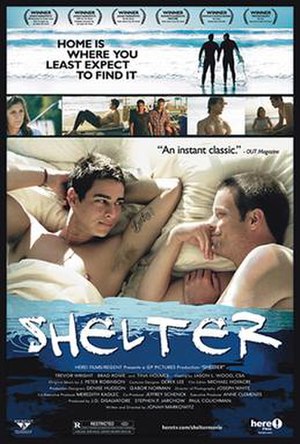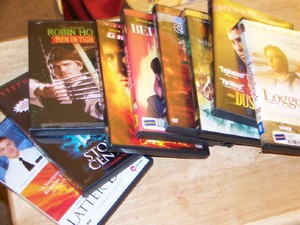 While guest-blogging at The Wild Hunt, John Morehead proposed using science fiction movies as a basis for interfaith dialogue. His idea and the post itself are fascinating, and I strongly encourage my readers to check it out. It’s certainly a concept I want to think over and explore more closely. In the meantime, though, I’d like to turn my attention to one of the responses that John’s post generated. Hadiah Starlight commented a bit on the poor representation of Wiccans and other Pagans in cinema in general:
While guest-blogging at The Wild Hunt, John Morehead proposed using science fiction movies as a basis for interfaith dialogue. His idea and the post itself are fascinating, and I strongly encourage my readers to check it out. It’s certainly a concept I want to think over and explore more closely. In the meantime, though, I’d like to turn my attention to one of the responses that John’s post generated. Hadiah Starlight commented a bit on the poor representation of Wiccans and other Pagans in cinema in general:
I agree that cinema is a reflection of what is going on socially in our
world, but as a Pagan I find it very sad, and disheartening that we are
still not presented in a more “positive light”, and that people’s idea
of witchcraft is the Harry Potter films, or The Craft. We are briefly
presented in a more positive light, in the Lord of the Rings series,
but until we are presented as anything other than “Science Fiction” we
will never be taken seriously.
Leaving aside the question of whether or portrayal in cinema really affects how seriously we’re taken (I’m personally inclined to think that if any causation between the two points exists, it’s more likely to run in the opposite direction), this comment caused me to wonder how Christianity and religion in general fairs in cinema. So I walked over to my media cabinet, combed through the 300+ DVD’s I currently owned, and started pulling out any DVD I felt had some sort of religious portrayal in it. I ended up with about 25 DVD’s (a smattering of them are represented in the picture attached to this post). Furthermore, I felt my choice to include some of the titles might have been a bit generous.
While I don’t claim that my personal DVD collection is a representative sample of all cinema out there, I do think that the relatively low percentage of titles I pulled that I felt had some religious content is quite telling. It would seem that a great number of movies simply don’t have much to say about religion at all.
I began to comb through the titles that I had pulled out and started considering the similarity between how religion was incorporated into the movie. I began to notice that the titles seemed to fit a few different categories. The first and most obvious category were those movies that were intended to offer editorial commentary on religion or certain aspects of some religious subcultures. Two such examples are Saved! and Dogma. As these kinds of movies tend to be heavy in satire and highly critical, I’m not sure we as Pagans sould be in a hurry to see these kinds of movies about our own faith traditions. They may be helpful in the future as our traditions become more established and could benefit from such criticism. But for right now, I think we’re better off being grateful that our religions aren’t being represented by these kinds of movies.
Unsurprisingly, a considerable number of movies in this category were science fiction movies. In these movies, religion became framework for understanding the classic battle between good and evil that drive these movies. The Exorcist, Ghost Rider, Constantine, and The Lion, The Witch, and the Wardrobe are all good examples of this category of movie. Indeed, the abundance of these kinds of movies suggests that it’s not just Pagan religions that are most easily explored, represented and expressed through science fiction. So that’s a limitation we may simply need to accept for now.
I will note, however, that Christian-themed science fiction does appear to be of a theologically superior quality than Pagan-themed science fiction most of the time. Each of the movies I listed above spend a great deal of time exploring a cosmology and theology that explains the world where these fantastic and even supernatural stories take place. The nature of heaven and hell as well as their relationship to the “natural world” is explored in Constantine in fascinating detail that suggests a worldview far more complex than anything seen in The Craft.
But when one considers the amount of Christian theology and cosmology that is readily accessible to the average screenwriter, this shouldn’t come as a surprise. Many of them probably grew up learning about it. Almost all of them have spent their lives surrounded by it. And then there are simply libraries full of books that they can learn about it from. And some of the best religiously-themed science fiction — such as the Chronicles of Narnia — have been written by Christian theologians themselves.
Compared to this, Pagan theology and cosmology (in its numerous forms and variations, no less) isn’t as easily accessibe. There’s not nearly as much written about it. Most people have not learned it first hand, nor do they come into contact with it regularly. Is it any wonder that Pagan theology is less well developed in the movies then?
The final general category of movie I found was those movies in which religion somehow influenced the plot and created. The best examples of this in my collection include Latter Days and Rock Haven, which are movies about young men who find themselves facing romantic and sexual feelings that their religious says are sinful and must be changed or repressed. These movies then center around that conflict, the effects it has on the characters, and the eventual resolution. Similar movies exist that deal with other faith struggles, such as understanding and coming to terms with tragedy and loss.
Personally, I would love to see similar movies from a Pagan perspective. I would love to see movies where a Pagan character tries to reconcile his faith with life issues or find comfort and guidance through tragedy and difficulty from his faith. The problem is, writing such a movie again requires a deep understanding of Pagan theology and philosophy, as well as how the affect the rest of an adherent’s life. This is not the kind understanding that the average screenwriter is going to possess. In short, Hollywood isn’t going to make this kind of movie simply because it’s ill-equipped to do so.
If we as Pagans really want to see positive portrayals in cinema, I think we’re going to have to find those in our community who are ready to be the story-tellers and the screenwriters who will do it. After all, we are the only ones who can portray our lives because we are the only ones living our lives.
So as much as I’d love to see better portrayals of my faith on the big screen, I won’t hold my breath until I or another fellow Pagan is prepared to write them and try selling them to a movie studio.



